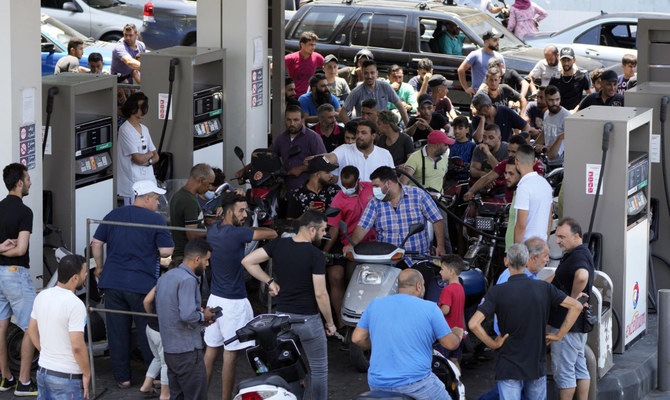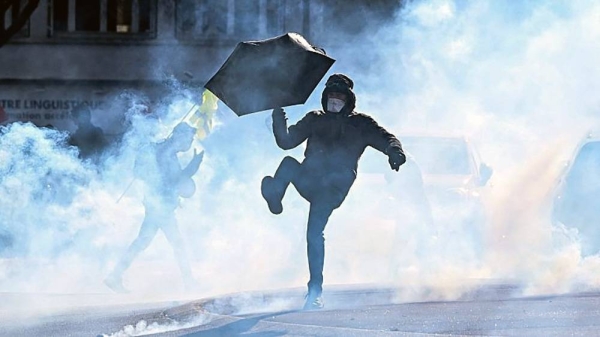
Protests in Basra against government services started last month after power supplies plummeted. (AFP)
Updated 2 min 46 sec ago
SUADAD AL-SALHY
August 07, 2018 20:17
203
Sabotage of power lines increased dramatically after protests began
"Almost all the political parties are involved," senior national security official tells Arab News.
BAGHDAD: Growing attacks against Iraq’s electricity infrastructure are being orchestrated to fuel widespread protests and thwart Prime Minister Haider Al-Abadi’s attempts to quell the crisis, Iraqi officials have told Arab News.
Sabotage of power lines and pylons has increased dramatically in the three weeks since protests in the south plunged the country into its latest security emergency.
Demonstrations in impoverished Shiite-dominated provinces and Baghdad have focused on the lack of basic services and high rates of poverty and unemployment.
But the main trigger for the protests, which started in Basra on July 18, was the serious shortage of electricity, leaving Iraqis with less than six hours of power a day in summer when temperatures reach 50 degrees Celsius.
The situation was exacerbated when Iran suspended the supply of 1,000 megawatts across the border, after Iraq was unable to maintain payments due to the difficulty of sending money because of new sanctions.
While sabotage of power lines is relatively common in Iraq, attacks became a daily occurrence just two days after the protests started in Basra, the country’s main oil hub.
Official records obtained by Arab News showed that between July 20 and Aug. 4 at least 22 sabotage attacks targeted power lines supplying the southern and northern provinces except the Kurdistan Region.
Just five attacks took place between the start of April and July 20.
Most of the damage involved shooting down power lines or blowing up the bases of towers, officials told Arab News.
“These are sabotage attacks, not terrorist, and they are aimed at weakening the government and covering up the ministry’s achievement,” Mohammed Fattehi, the media adviser to the Minister of Electricity, told Arab News.
“Our maintenance teams work day and night to repair the damage, but the attacks occur on a daily basis, indicating that they are planned, not random.”
The sabotage and the protests are taking place at a time when Iraq is in political limbo after May elections, with attempts to build a coalition large enough to form a government stalled.
Arab News reported last month that protests have been hijacked by political forces attempting to harness the public anger to further their own causes.
Many have used the demonstrations to weaken Abadi, who is hoping to secure his second term as prime minister.
Investigations by Ministry of Electricity field teams and local security services recorded that the attacks were carried out by unknown persons, but federal security officials said they have identified perpetrators in each region.
“Almost all the political parties are involved,” a senior national security official told Arab News.
“Our investigations suggest they (the parties) have been funding these attacks.
“Kurdish parties are behind most of the attacks that took place near Kirkuk and Diyala. Sunni and Shiite parties are totally behind the rest.
“They aim to fuel the demonstrations and promote the idea of Abadi’s inability to address the problem (of electricity).”
The security official said that in the south and near Baghdad, all Abadi’s rivals are involved in the attacks. Even Sadrists (the followers of Muqtada A-Sadr), who publicly support Abadi, have carried out some of these attacks, the official said.
Decades of neglect, wars and economic blockade, along with the absence of strategic planning and the spread of corruption, have derailed nearly all of Iraq’s infrastructure projects, especially in the water and electricity sectors.
Most Iraqis receive less than 12 hours of electricity a day from the national grid. This is cut to less than half in summer, especially in the southern provinces, when usage spikes amid the high temperatures.
Iraq’s Ministry of Electricity said the country needs between 22,000 and 23,000 megawatts at peak times in summer. Current production does not exceed 15,000 megawatts in a country with some of the world’s largest oil reserves and vast solar potential.
The attacks on the power lines often cause power to go down across vast areas for 24 hours at at time.
Anger at the shortages meant the protests quickly turned violent, with 14 demonstrators killed and hundreds wounded, mostly members of the security forces.
Protesters stormed headquarters of oil companies in Basra, an airport in Najaf and several partisan offices in Ammara, Najaf and Diwaniya and set fire to government buildings in other provinces.
Since the 2003 US-led invasion, the Ministry of Electricity has been one of the wealthiest government departments, and political parties have battled to control it because of its high annual budget.
They have also used the department as a tool to attack their rivals.
Successive Iraqi governments spent more than $60 billion in the last 15 years to develop the electricity sector, but no significant improvement has been seen.
All the ministers and deputy ministers who ran the ministry during the past four governments have left their positions facing corruption charges. Only one has been convicted so far.
The current electricity minister, Qassim Al-Fahdawi, was interrogated by parliament last year over alleged corruption, but kept his job due to a lack of evidence.
In an attempt to appease protesters, Abadi last week suspended Fahdawi “to investigate the reasons behind the weak performance of his ministry.”
To prove the failure of any government, political parties usually resort to focusing on electricity.
In October 2013, the political rivals of Nuri Al-Maliki, the then prime minister, refused to vote on a bill that would allow him to offer contracts to global companies to build multibillion-dollar infrastructure projects to improve the daily basic services. The move was one of the main factors that denied him a third term.
“It (electricity) is purely a political file that has been used in the past 15 years to pressure successive governments,” Iraqi analyst Abdulwahid Tuama told Arab News.
“They used it to prevent Al-Maliki from winning a third term and now they are using it to prevent Abadi from winning a second.”












